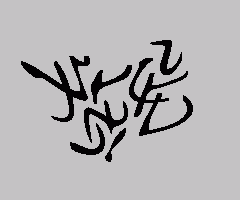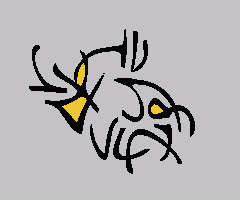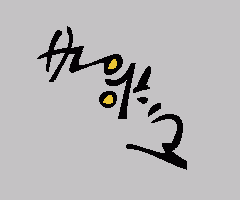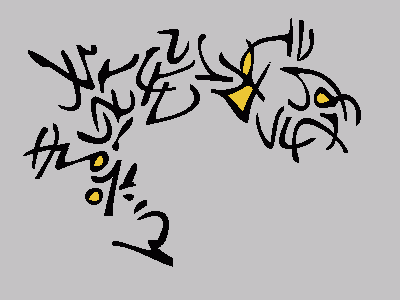Her abrupt departure left me a little shaken and I sat down in a chair, plopped like a sack of potatoes. I sat there for a while, staring at her bowl, thinking of nothing much. Eventually I heard a tick-tick-tick at the window and I looked up. A tiny gray bird was pecking at the window frame. It was Ga-ukogomen in his kinglet smallform. I hastened to my feet and opened the window. It is a peculiar thing to hear words of unmistakable clarity spoken from the beak of a bird. You almost feel you should look for a puppeteer or a ventriloquist. Ga-ukogomen spoke only five words before he flicked away through the Tecomaria vines that crowd the light from that window. He said, "You need paper and coffee."
After I made coffee, I sat down at the table with my mug and a piece of typing paper. I stared at Tsitao-utna's bowl and pencil, drinking my coffee, trying not to think about what I was going to draw. Messages from the Lorwolm are not meant for me, and I believe I might damage the conduit of transmission if I try to interpret them while I am in the process of writing them down for the first time. After I have written them down, clear and complete, a certain order might suggest itself, and only then do I allow myself to edit.
This is what I wrote:

I left the bowl, pencil and paper on the table. The next day, I added this to the first drawing:

On the third day, I added this:

I was staring at the page, wondering if I was finished, wondering if there was another line or squiggle I needed to draw, when a flicker at the edge of my eyesight made me look up. Ga-ukogomen was perched on the back of the chair opposite me, snapping his wings as birds do when they are setting their feathers into order.
He repeated Tsitao-utna's phrase, "Siksga kelzwun rahben." Except this time I heard, "Six gackles, one robin." And Ga-ukogomen extended it, so the whole sentence became "Six gackles, one robin, twelve blue feathers."

"It will be the name of the last Mesiok, " Ga-ukogomen added. "She will not leave this planet until the second gyre of the Four Wandering Moons."
When the Lorwolm use the term "leave this planet", I think they are talking about death, but I am not sure. They might be referring to a journey. To the Lorwolm, death and life are part of the same journey. They do not think of death as an absence of life, since they have died and lived many times. They regard death as a process of life, and fear it no more than we fear things like sleeping and digestion.
"Will she be an important person?" I asked Ga-ukogomen, but as soon as I spoke I realized it was an unnecessary question. Everything the Lorwolm tell me will have significance, some day in the future.
"She will be the last Mesiok," Ga-ukogomen repeated. "Her name will be a key to a locked book and a doom to a continent."
No comments:
Post a Comment